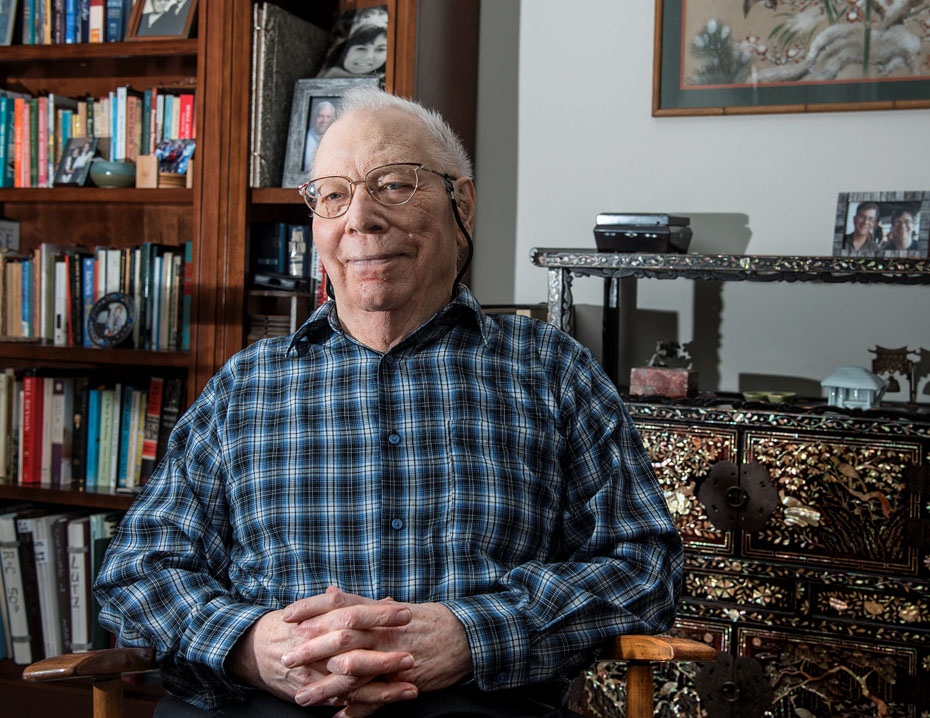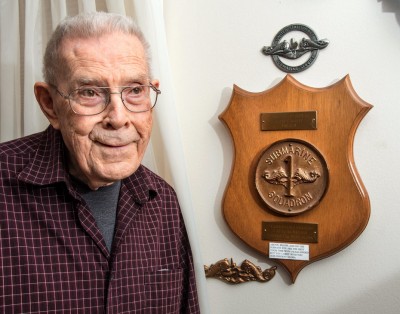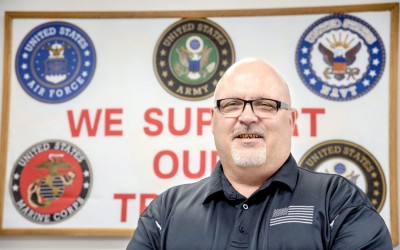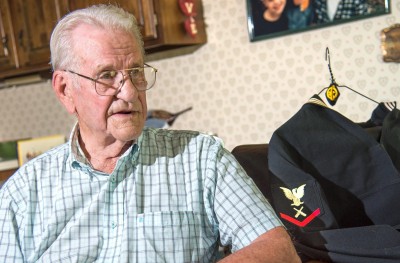Richard Underwood
By Paul Wood

Photo By Heather Coit/The News-Gazette
URBANA — On Memorial Day, Lt. Richard Underwood remembers family, as well as two friends, who died in Korea.
Between his two stints serving as an interpreter and security officer in Korea, his own mother was shot in the back by insurgents. His father died of chronic heart problems he endured while serving the U.S. Army as an adviser during the war in Korea.
Underwood’s grandparents and parents were missionaries and college teachers, and he spent most of his life in Korea, before finally moving to Champaign to be near a daughter at the University of Illinois.
His youth was spent in Japanese-held Korea for all but three years.
From the time he was 15 until he was drafted at 18, just as World War II was being won in Europe, Underwood spent high school in Brooklyn, after being returned to America post-Pearl Harbor in exchange for Japanese returned to Japan.
The horrors of war require that “as a Christian, I forgive but never forget.”
The retired teacher, 89, quotes, “Those who cannot remember the past are condemned to repeat it” by philosopher George Santayana, who also wrote “Only the dead have seen the end of war.”
As a child in Korea, Underwood went every Memorial Day to a cemetery to remember those lost in World War I.
But he pointed out that the French and English didn’t remember the lessons of the War To End All Wars, and only 20 years later were embroiled in yet another and even deadlier war with Germany.
Upon high school graduation, Underwood was immediately put in the service of the OSS, the wartime precursor of the CIA, simply because the military had so few recruits who could speak Korean.
Underwood is humble about his language skills; he learned it as a child, but never formally studied it, so he “reads like a first-grader.”
Instead of going to basic training like everybody else, Underwood was trained by the OSS in “49 ways to kill your enemy with your bare hands.”
He was scheduled to be dropped into Japanese-occupied Korea to serve as a controller of spy units.
“I think that would have been as practical as jumping out of a plane without a parachute,” he said.
But two atom bombs ended the war with Japan.
Instead, he was assigned as a liaison with Soviet officers in the north, in October 1945, back in the land where he’d grown up, serving as a staff sergeant.
The nation was in the process of being partitioned along the 38th Parallel.
Once, he was alone on the street when Soviet soldiers approached him armed with machine guns.
“My Russian-speaking officers had taught me a few choice cuss words in Russian, and I used every single one of them” to convince the soldiers to leave him alone, he said.
He was able to gather information from North Korean civilians, including North Korean mechanics while talking cars.
The Siberian Soviet troops, he believed, were not stupid but “ignorant.”
They could not read, had not been taught about sanitation and used water from sewage-infested streams to brush their teeth, and believed “Uncle Joe” Stalin’s propaganda that the American Chevys they saw were actually built in Russia, Underwood said.
As communists stepped up their efforts to take all of Korea, the military forbade the execution of southern soldiers in Yeosu who’d received letters telling them to turn against their new country in the south on the basis that they would have obeyed the letters.
Later, there was an armed revolt in Yeosu that claimed many lives, and he wonders about the advice they gave out, a moral dilemma to this day.
Underwood eventually left the service and went to college.
When the Korean War flared up with American and Chinese involvement, he was back in the Army as a second lieutenant, even though he’d never led a platoon.
He said that he was probably “the least military-trained lieutenant in the U.S. Army.”
Still, he saw atrocities as a million Koreans fled south to escape communist rule. The country had now become a nation in brutal civil war.
He learned of South Koreans thrown down wells by North Korean troops. The ones on top had been shot and died quickly, he said, but the ones on the bottom had been forced to jump in and slowly suffocate.
Despite all the suffering he has seen in his life, Underwood wrote a memoir for his family called “What A Fun Life!”
He and wife Carol have four children: Beth, David, Fred and Marilyn.
Do you know a veteran who could share a story about military service? Contact staff writer Paul Wood at pwood@news-gazette.com.
Read more stories from local veterans:
 Floyd Bailey
URBANA — Floyd Bailey wondered for a couple days if he was crazy — or it was his doctor — before the Navy decided he was …
Floyd Bailey
URBANA — Floyd Bailey wondered for a couple days if he was crazy — or it was his doctor — before the Navy decided he was …
 Brad Gould
URBANA — When U.S. troops began massing for action in the Persian Gulf, Brad Gould found himself shuttled in an unmarked …
Brad Gould
URBANA — When U.S. troops began massing for action in the Persian Gulf, Brad Gould found himself shuttled in an unmarked …
 Don Pittman
LODA — Unlimited beer and hand grenades are a bad mix. When former Illini football player and legendary wrestling coach …
Don Pittman
LODA — Unlimited beer and hand grenades are a bad mix. When former Illini football player and legendary wrestling coach …